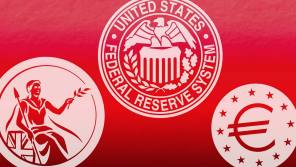

Investors have become too reliant on central banks, according to the latest report from the Bank for International Settlements (Bis), warning they have become overburdened for “far too long”.
Claudio Borio, the head of the monetary and economic department at Bis, expressed concern that markets are becoming increasingly sensitive to central banks’ every decision.
He pointed to the recent frenzied bond sell-off, believed to be caused by the European Central Bank and the Fed hinting at the future course of monetary policy.
He said any switch-up in policy is prone to causing market tumbles, and claimed a more balanced policy mix is “essential” to make the global economy more balanced and sustainable.
Mr Borio’s remarks follow a quarterly report from the organisation, which pointed to the dependence of asset prices on the actions of central banks.
According to Mr Borio, markets struck some dissonant notes after the EU referendum on the 23 June, which he said was a “huge surprise that wrong-footed market participants”.
During the next couple of days, equity prices plummeted, volatility spiked, credit spreads widened and sterling sank to a 30-year low.
“The markets undid, with interest, the gains they had made during the previous week, when a ‘remain’ outcome had appeared all but certain - in market prices, not in the polls,” Mr Borio said.
However, despite the turbulence, markets continued to function well, and market liquidity held up.
He said: “Central banks were quick to provide reassurances, with both individual and joint statements that underlined their readiness to provide support to markets, institutions and the economy, if the need arose.
“Even so, the speed of the recovery took many by surprise, given the political and economic uncertainty that the vote had triggered.”
Mr Borio’s worry centres on investors basing their portfolio decisions on more monetary policy, rather than the underlying fundamentals of the global economy.
He said the prospect of lower rates has had a dual effect: fuelling a shift into equities and a search for yield, while raising serious concerns about banks’ profitability, as ultra-low rates and flat yield curves tend to erode their net interest margins, in turn delaying the necessary clean-up of banks’ balance sheets.
“There has been a distinctly mixed feel to the recent rally - more stick than carrot, more push than pull, more frustration than joy. This explains the nagging question of whether market prices fully reflect the risks ahead.
“Doubts about valuations seem to have taken hold in recent days. Only time will tell.”



